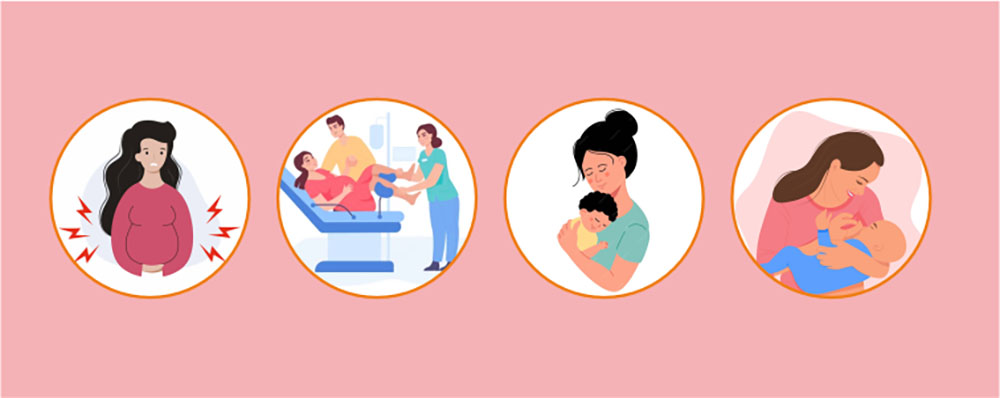When the day to meet your little one starts approaching, your happiness level rises but so does your anxiety. Labour and birth involve four major stages, each with its own purpose and pace. Once you're aware of all of them, it helps you navigate the situation better and make informed decisions.
Stage 1: Early Labour (Dilation)
Duration:
Varies but can take 12-24 hours for first-time mothers and 6-12 hours for subsequent deliveries.
What happens:
- Cervical changes: The cervix, the opening to the uterus, begins to soften (efface) and widen (dilate) to allow your baby's passage.
- Contractions: Mild to moderate contractions start, initially irregular and spaced far apart, gradually becoming stronger, longer and closer together.
- Possible signs: Backaches, cramps, watery discharge or a "show" (loss of mucus plug from the cervix).
Tips for stage 1:
- Rest and relax: You may feel energetic at first but conserve your energy for later stages.
- Stay hydrated: Drink plenty of fluids to maintain energy and prevent dehydration.
- Listen to your body: Eat light meals if you feel hungry, move around freely and change positions for comfort.
- Practice relaxation techniques: Deep breathing, meditation or visualisation can help manage discomfort.
- Stay connected: Reach out to your birth partner or healthcare provider if you have any questions or concerns.
Stage 2: Active Labour (Delivery)
Duration:
Usually 2-4 hours but can be longer.
What happens:
- Stronger contractions: Contractions become more intense and frequent, lasting 30-60 seconds and occurring 2-5 minutes apart.
- Baby descends: The baby's head moves down the birth canal, putting pressure on your pelvis.
- Pushing: You may feel an urge to push with each contraction, helping your baby move through the birth canal.
Tips for stage 2:
- Focus on pushing: Listen to your body and push with each contraction as effectively as possible.
- Change positions: Experiment with different positions (squatting, kneeling, side-lying) to find one that feels comfortable and facilitates pushing.
- Stay hydrated and energised: Small sips of water or clear fluids can help maintain energy.
- Stay positive: Remember the end is near! Encourage yourself and trust your body's ability to deliver your baby.
- Communicate with your healthcare provider: Follow their instructions and voice any concerns you might have.



